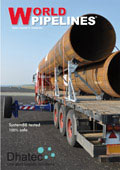Editorial comment
The battle of the proposed gas pipelines Nabucco, Nord Stream and South Stream continues to escalate with the successful pipeline having the potential to alter the European Union’s (EU) dependence on Russian gas.
Register for free »
Get started now for absolutely FREE, no credit card required.
Currently Russia plays a critical role in the European energy sector as the largest exporter of natural gas to the EU. Security of gas supply issues are paramount for the EU to address, as many fear Russia’s unstable relationship with neighbouring countries could mean more gas shortages and cut-offs during winter, as seen in previous years. If Europe’s dependence on Russian energy continues to rise, it will remain vulnerable in terms of its bargaining power and political leverage.
The proposed pipelines will supply natural gas to businesses and households throughout Europe but will differ in their source of supply. Nord Stream is a proposed sea-based pipeline running from Baltic Russia into northern Germany whilst South Stream proposes to transport Russian gas from the Black Sea to Bulgaria, then into Hungary, Italy and Austria. With the backing of the EU Parliament, motivations behind Nabucco are mainly political in an attempt to bring alternative gas to Europe by avoiding any Russian territory. Not all three proposed pipelines can be effectively developed and run profitably, making competition stakes exceptionally high. The issue of the EU’s security of supply has become a significant political matter in the 21st century and if Nabucco is successful, it is anticipated to change Europe’s political landscape entirely with its side stepping of Russia. However, Nabucco has been critisised due to its lack of funding and whether it will receive sufficient gas supply to make it profitable. Despite this, recently Iraq, Egypt, Syria, Turkmenistan and Azerbaijan have shown interest in contributing gas, meaning that securing supply may no longer be an issue for Nabucco.
In order to sustain its monopolised position in the European gas market, Russia is pushing ahead with competing pipelines, Gazprom’s South Stream and Nord Stream. These pipelines are said to have a higher predicted success rate due to sufficient funding and gas supplies. However, the South Stream pipeline is said to be nearly twice as expensive as the Nabucco pipeline.
The fate of the European Union’s long-term energy future and the ‘battle of the pipelines,’ will be debated and explored in further detail at the European Autumn Gas Conference (EAGC) held in Berlin on 9 - 10th November 2010, where some of the key figures involved in all three pipeline projects will be present.
The EAGC takes place at a critical time for all three pipelines as the projects move into final stages. The critical question however, is “Will the European Union diversify its gas sources and pipeline routes to reduce its current dependence on Russia?”


